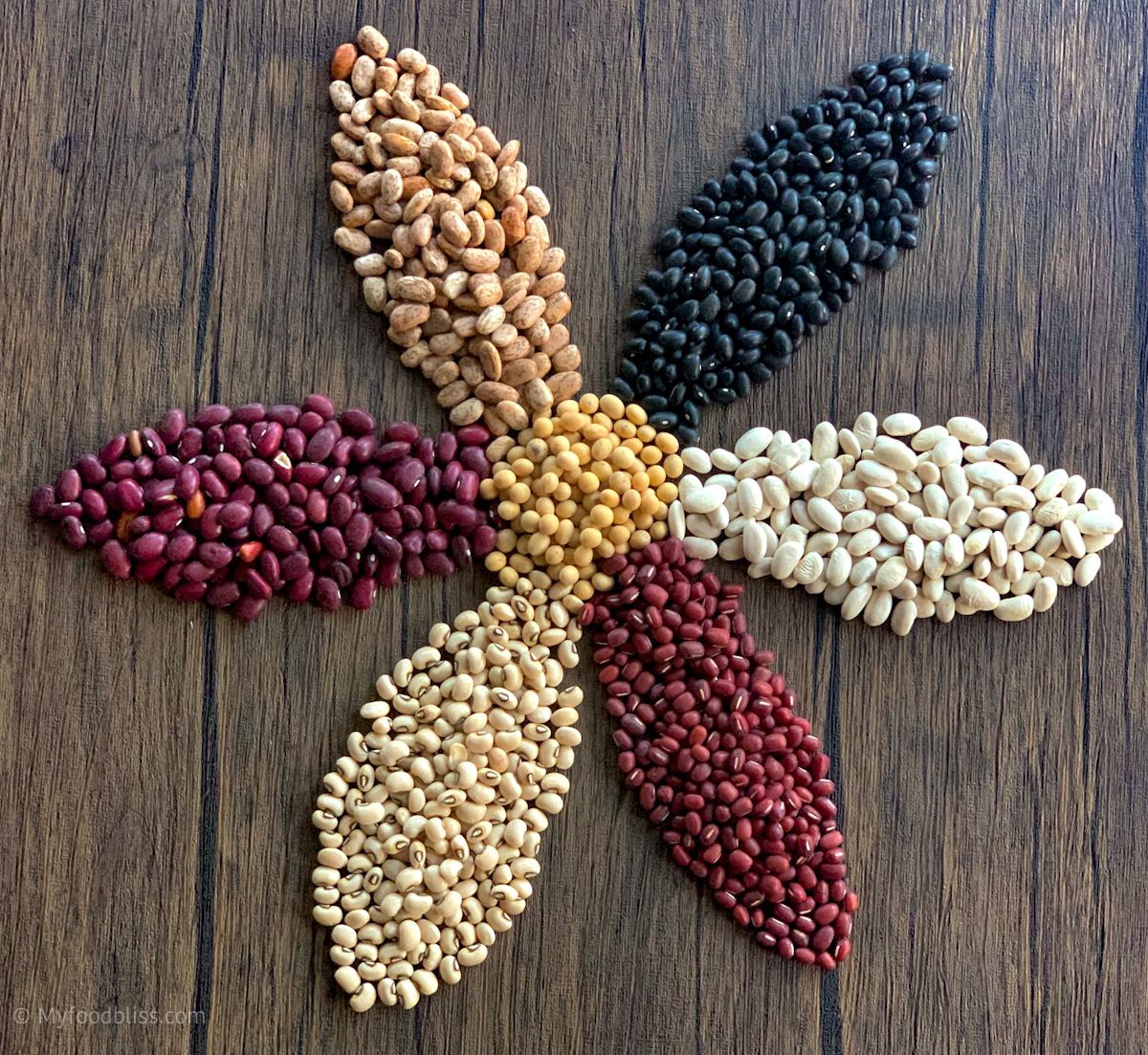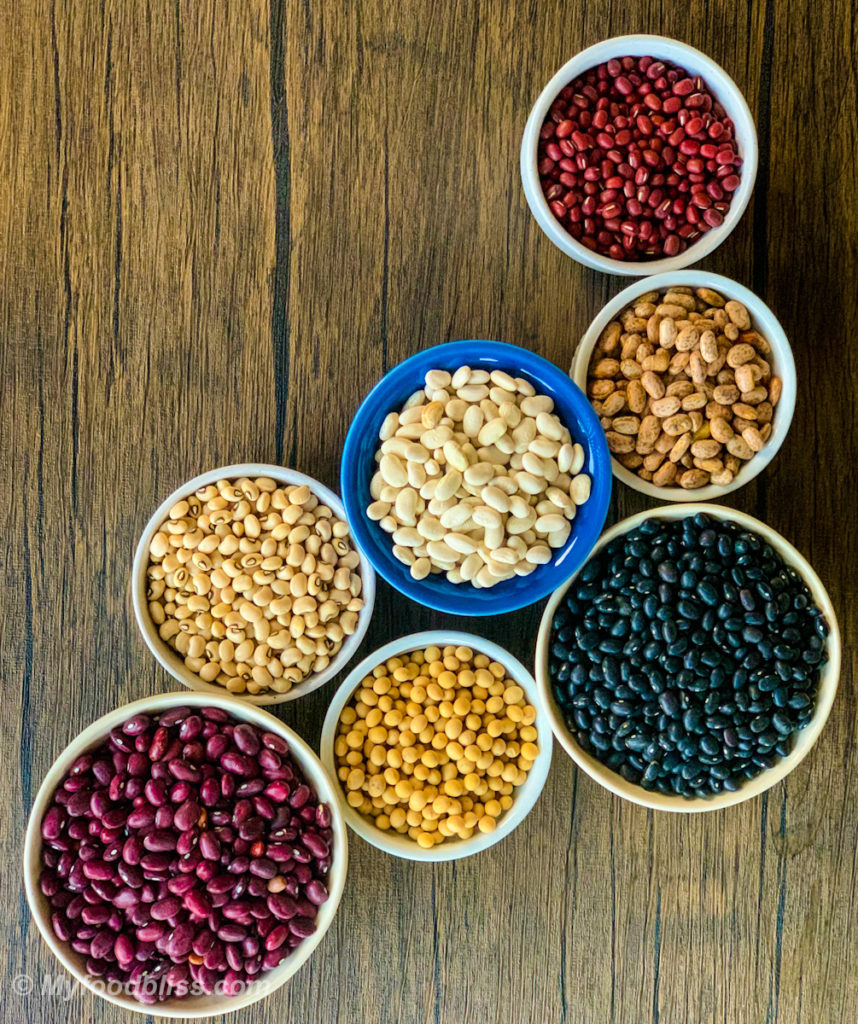Spilling the beans about Beans

Legume family is made up of oil seed legumes (soybeans, peanuts), fresh legumes (beans, peas) and pulses (lentils, chickpeas, dry common beans). This article is a quick round up on the common dry beans. The earliest grown beans are about 9000 years old and thought to have origins in Peru. Historically, beans were considered as poor man’s meat and rarely were a part of royals dinner tables. From Roman Gladiators to many civilizations across the world, beans were a main part of the meal, until few decades ago where we started to ‘civilize’ our food.
Types of Beans-to name a few-Black beans, kidney beans, navy beans, red beans, lima beans, adzuki beans, pinto beans that are widely available at a fraction of price compared to meat, imitation meat or even tofu.
The Nutrition Content of Beans-
Beans are very rich in complex carbohydrates. Resistant starch is the carbohydrate that is resistant to digestion in the small intestine and is vital in maintaining steady glucose level in the blood. Beans are rich in resistant starch, with navy beans on the top of the list.
Beans are one of the most protein rich foods in plant based diets and provide complete source of protein, including a very important amino acid lysine, that is lacking in many grains. About 1/2 cup beans provide about 20% of daily protein needs in adults. Typically only about 3% of the calories in beans are from fat, which is mostly unsaturated.
Beans are one of the richest sources of soluble fiber, which is pivotal in maintaining gut health and helps with cholesterol control. Polyphenols are plant compounds that are potent antioxidants. Beans contain plenty of polyphenols especially in the seed coat. In addition, beans are excellent sources of vitamins (especially folate, B3) and minerals (notably Calcium, Magnesium, Phosphorus, Iron, Potassium), and are superior to other legumes in that aspect.
The Health Benefits of Beans-
Weight loss, diabetes control, heart health, gut health, blood pressure control, anti cancer properties, are key benefits of beans that are scientifically evident. With the ever growing metabolic diseases at this time, beans are a powerful medicine for prevention and reversal of rainbow of diseases. Taking a dose of beans with most meals is far less harmless than dose of various medications used for chronic diseases.
| Health effects | Mechanism |
| Cardioprotective effect | Decrease cholesterol, blood pressure, heart rate and inflammation |
| Improved Diabetes control/Anti diabetes effect | Increase insulin sensitivity, Sustained glucose control |
| Weight loss/ control | Improved Satiety, Decreased inflammation, |
| Gut health | Increased microbial diversity and Short chain fatty acid production |
| Anti cancer effect | Antioxidant and anti inflammatory actions |
Improving beans digestibility-
Soaking beans for at least 6-8 hours, and preferably overnight, followed by rinsing them before cooking thoroughly. This allows the indigestible carbohydrates to be washed away and minimizes the chance of discomfort upon eating.
Sprouting beans, if you have the time, improves the nutrient availability and digestibility as well.
Adding a pinch of baking soda while cooking, increases the pH and reduces the oligosaccharide content.
Adding a little bit of epazote– a Mexican herb while cooking beans to reduce bloating. Epazote is a carminative, which means it can break down some complex carbohydrates in beans, and reduce gas production.
If you are new to beans, work your way up on the amount you eat every day. Start with smaller legumes like lentils, black eyed beans and as you build tolerance, try larger beans with higher fiber content.
Environmental impact of beans-
Beans are a sustainable food source that the world should lean on for the health of humans and the planet. Given their nitrogen fixing properties, beans need less fertilizer use which in turn reduces green house gases emission. Less fertilizer use means, less leaching of chemicals into waterbodies, which can prevent dead zones in our fresh water sources.
It is projected that switching for beef to beans will help us cut down green house gas emission by almost 75%. Also it will free up about 42% land currently used to grow feed for the animals that are raised for dairy and meat.
Bottom line-
Welcome beans into your pantry and try to incorporate at least 3 cups/ week into your meals. Try a variety of beans for better gut health. Beans have numerous health benefits and are one of the easily available, cheapest sources of complete protein. Beans are very versatile in the kitchen and can be added to anything from salads to desserts. Have a portion of beans cooked and ready to go in your fridge to incorporate in your meals. If you are experiencing gas, bloating with beans, do follow the cooking tweaks mentioned above to reduce the discomfort after ingestion.
Truly these are ‘ cool beans’. Science proves it. Go for the beans..regardless of where you have ‘BEAN’ in your health journey.

References-
Mullins AP, Arjmandi BH. Health Benefits of Plant-Based Nutrition: Focus on Beans in Cardiometabolic Diseases. Nutrients. 2021 Feb 5;13(2):519. doi: 10.3390/nu13020519. PMID: 33562498; PMCID: PMC7915747.
Virginia Messina, Nutritional and health benefits of dried beans, The American Journal of Clinical Nutrition, Volume 100, Issue suppl_1, July 2014, Pages 437S–442S, https://doi.org/10.3945/ajcn.113.071472
Ganesan K, Xu B. Polyphenol-Rich Dry Common Beans (Phaseolus vulgaris L.) and Their Health Benefits. Int J Mol Sci. 2017;18(11):2331. Published 2017 Nov 4. doi:10.3390/ijms18112331
Harwatt, Helen & Sabaté, Joan & Eshel, Gidon & Soret, Sam & Ripple, William. (2017). Substituting beans for beef as a contribution toward US climate change targets. Climatic Change. 143. 10.1007/s10584-017-1969-1.
